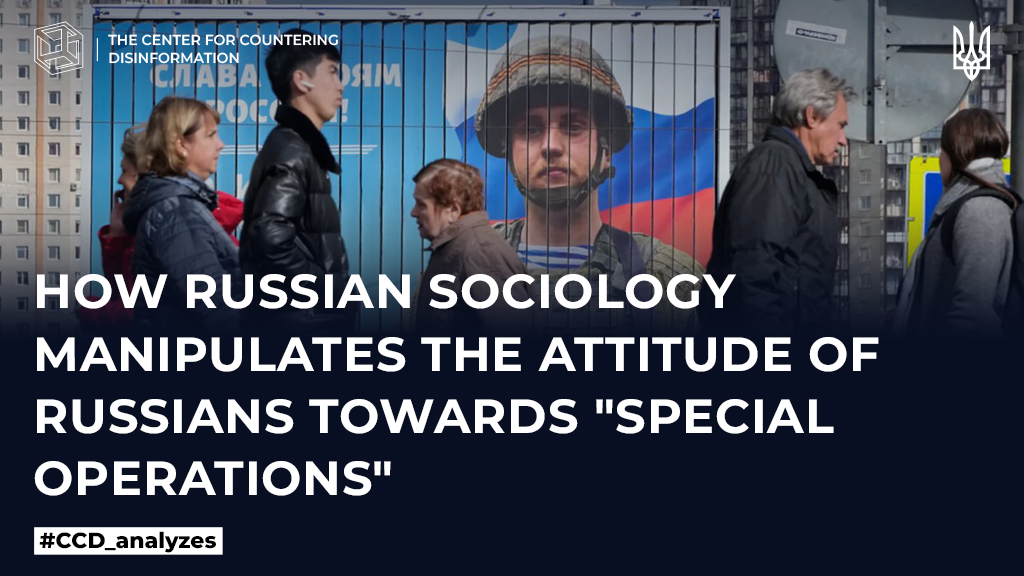russian propaganda likes to quote the results of public opinion polls, which every time confirm maximum support for putin’s decision to conduct military operations in Ukraine. The all-russian center for the study of public opinion always provides the right numbers showing a consistently high level of support for the war among russians. Thus, according to state opinion polls, 71% of russians support the war in Ukraine, and only 21% do not.
Why do such polls look suspicious from the point of view of their credibility even within russia?
Firstly, such totalitarian regimes as putin’s cannot have survey sociology at all. Polls only work when people are willing to tell the truth. In a country where discrediting the participants of the “special operation” is punishable by 3 to 15 years of imprisonment, and the leading role of the “witch hunt” is assigned to the FSS, the data of such sociological surveys have little significance. After all, when people in putin’s russia are asked on the street or on the phone how they feel about putin’s policies, more than 90% of respondents refuse to answer the sociologist’s question, and 5% confirm their support for the dictator’s actions.
Secondly, in russia, the number of people who cannot under any circumstances support the war in Ukraine and, accordingly, putin’s decision to conduct it, is increasing every day. We are talking about relatives and friends of 320,000 mobilized people who receive news about the injury, death or capture of their sons, brothers, grandsons and husbands in Ukraine. Public information about the theft of soldiers’ uniforms, the incompetence and corruption of military leaders, who instead of their sons send the children of those who could not redeem themselves to the “meat grinder”, is unlikely to increase the level of russian support for the war. About 1 million young people are automatically added to the number of “dissenters” who went abroad with the start of the “special operation” and, under fear of reprisals, choose to support aggression upon their return.
Thirdly, the total hysterical support for the war on federal channels is only evidence that the public space is completely monopolized by the state, propaganda, information war, where only supporters of putin’s policy appear. It should be added that despite formal declarations of support, the majority of the leadership and personnel of the armed forces and power structures did not support this war from the very beginning and will ever say so openly.
It is clear that such opinion polls are intended exclusively for propaganda purposes aimed at demonstrating popular support for the war and putin’s policies. The leaders of the kremlin themselves use the results of closed opinion polls, which more or less reflect the real state of affairs. Thus, according to the results of the last closed public opinion poll conducted by the federal security service on behalf of the kremlin, about 55% of russians are now in favor of peace negotiations with Ukraine, and only 25% are in favor of continuing the war. These figures generally coincide with the results of a survey by the only large independent sociological center in russia, “Levada-Center” (“for” peace negotiations – 57%, “for” the continuation of hostilities – 27%).
Proponents of negotiations explained their opinion by the desire to stop the loss of people: “young boys are dying”, “there are already too many victims”, “you can’t kill each other”, “a bad peace is better than a good war”.
Proponents of the continuation of the war spoke mostly about the fact that “the beginning must be brought to victory”, “the fascists must be crushed”, “Ukrainians themselves do not want peace”.
It is characteristic that the number of russians advocating negotiations with Ukraine began to grow rapidly after the announcement of “partial” mobilization on September 21, 2022.
Specialists of the Massachusetts Center for Strategic and International Studies conducted measurements of public sentiment in the russian federation with the help of artificial intelligence FilterLabs.AI. The special program collected and analyzed public documents, people’s comments on social networks, media publications and other similar information in eight federal districts of russia, from siberia to the Far East, from the south to the northwest. The analysis carried out by such methods proved:
1. It is increasingly difficult for the kremlin to control public sentiment outside of the big cities through propaganda.
2. Although propaganda tries to confuse society, russians are less and less inclined to accept state narratives broadcast on state television.
3. The data collected by American researchers indicate a much greater “fragility” of the russian regime than is commonly believed. At the same time, researchers clearly recorded the growth of russian dissatisfaction with each new stage of the war – from the failure of the blitzkrieg to the beginning of mobilization in the russian federation.
❗️ The bigger the gap between desired and actual support for entering Ukraine becomes, the sooner putin and his entourage will lose real power and control over the situation.










